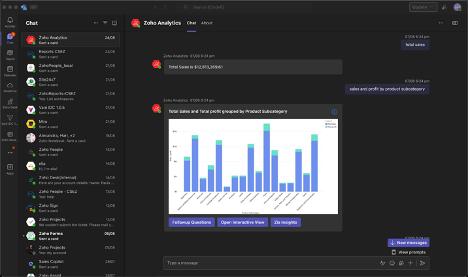Zoho Analytics’ latest release marks a significant milestone in its journey from a reporting tool to a comprehensive, AI-powered business intelligence platform. The update introduces more than 100 enhancements, emphasizing AI and machine learning capabilities. With this release, Zoho aims to make complex data analysis accessible and insightful for users across various roles and skill levels.
Key additions include generative AI capabilities for streamlined BI use, a data science and machine learning studio and improved data management features. These updates position Zoho Analytics as a strong competitor in this space, offering advanced functionalities at a competitive price point compared to competitors such as Tableau and Qlik.
AI-Powered Insights For All
Zoho Analytics’ updates include the platform’s AI assistant, Zia, which is now more deeply integrated into workflows. Zia offers assistance based on natural language queries, provides context, and enables users to trigger actions or develop custom models. This could further democratize data analysis, allowing a wider range of users to explore and gain insights from prepared datasets.
Zia Insights now delivers diagnostic analytics contextually, aiming to help users understand not only what’s happening but also why it’s happening. This shift towards “decision intelligence” seeks to empower users to make more informed, strategic choices. Additionally, with support for multiple languages and integration into popular collaboration platforms such as Microsoft Teams, Zoho is trying to ensure that insights are readily available regardless of what other tools a user may already be using.
The addition of the Auto Analysis feature further streamlines tasks automating metrics calculations, report creation and dashboard generation, potentially shortening time-to-value. Moreover, the integration with OpenAI, enhanced by retrieval-augmented generation, should enable Zoho users to leverage both public and proprietary data to generate more accurate and contextually relevant insights.
Bridging The Gap: Analytics And Machine Learning
The Data Science and Machine Learning Studio is another key addition to Zoho Analytics. Designed to integrate machine learning into analytics workflows seamlessly, it should empower both technical users such as data scientists and non-technical users like business analysts to build and deploy custom machine learning models without extensive coding. This integration should enable organizations to go beyond descriptive analytics, using the power of predictive modeling and forecasting to uncover deeper, forward-looking insights.
Features like AutoML (a no-code assistant for model building) and Code Studio (a Python coding environment for more advanced users) ensure that individuals with varying skill sets can contribute to developing and utilizing machine learning models. This again broadens access to analytical tools and ought to foster organizational collaboration across functional roles.
Empowering Multiple Organizational Personas With Data
Zoho Analytics’ latest updates deliver targeted benefits to various organizational roles. Data analysts gain a more robust toolkit in the Data Science and Machine Learning Studio, where they can build custom models and automate tasks so they can focus on more strategic work. Business analysts can leverage Zia’s natural-language processing to interact with data conversationally. IT architects should gain greater control over data integration and governance, while the platform’s extensibility should enable more seamless integration with other BI tools. Executives should gain a centralized view of key insights from multiple BI applications through the BI Fabric.
These updates can be particularly beneficial for marketing teams. Enhanced data management and AI-powered insights should allow marketers to consolidate data from various sources, track campaign performance and identify high-performing segments. By understanding the “why” behind trends, marketers can make data-driven decisions and optimize campaigns for better results.
Has Zoho’s Investment In BI Paid Off?
Zoho Analytics’ transformation from its origins as Zoho Reports in 2009 reflects Zoho’s long-term vision for business intelligence. The platform leverages years of investment in automation, low-code development and AI. The result looks to be a powerful, intelligent and user-friendly solution that should simplify complex data analysis for more types of users and businesses of all sizes.
These improvements will likely help Zoho Analytics compete more effectively against advanced analytics tools by empowering citizen data scientists to leverage data effectively without needing extensive technical knowledge. Zoho has positioned itself well in the market by offering advanced AI and machine learning capabilities while still maintaining its strength in self-service BI.
Read the full article here






